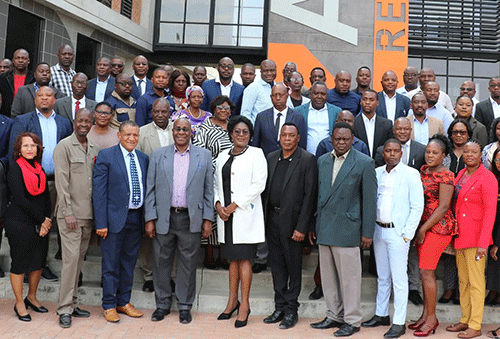KATIMA MULILO – While expressing grave concern regarding the non-submission of financial statements by regional and local authorities, auditor general Junias Kandjeke applauded the Zambezi Regional Council for leading from the front by submitting updated financial statements on time.
He made the complimentary remarks during the ninth stakeholder engagement session by the AG’s office in Katima Mulilo last week.
The session was to allow dialogue between the AG’s office, leadership and management of regional councils as well as local authorities to enhance transparency and accountability.
“Having struggled with a backlog of more than five years, the host council has managed to mitigate its challenges in submitting financial statements. I urge others to mitigate the challenges and submit their financial statements on time.
“I express concern regarding the non-submission of financial statements as it interferes with my ability to carry out my duty and adds needless delays,” Kandjeke told delegates from five regions of Zambezi, Kavango West, Kavango East, Ohangwena and Otjozondjupa.
Although the region was praised for clearing the five-year backlog for submitting financial statements, Zambezi governor Lawrence Sampofu told his team to learn from best practices set by other regions in the accountability and management of public funds.
“I would also like to express gratitude to the chief regional officer [Regina Lubinda-Ndopu] and her team for managing to clear the five-year backlog of submitting financial statements to the AG. This speaks of your commitment to making the Zambezi region great. I would like to encourage you to continue on this upward trajectory and start by improving your audit opinions to resemble this greatness,” Sampofu encouraged.
Sampofu urged all other participants to contribute and learn to improve their audit processes, especially taking cognisance of the importance of implementing the AG’s recommendations.
Another issue Kandjeke raised is the rise in the number of requests for extensions to submit financial statements that his office is receiving.
“I find it burdensome that consultants still prepare financial statements for local authorities,” he said.
Kandjeke said this will prevent delegated accountability and add costs to local authorities.
These sentiments were also shared by deputy director for internal audit in the ministry of urban and rural development, Martin Ngubai.
He suggested that regional and local authorities train their own financial managers to prepare financial statements instead of hiring consultancies.
In Kandjeke’s opinion, councils can use the money they spend on consultants to develop internal capacity, citing that about 90% of local authorities currently have complete structures for their finance departments.
“The only thing left to do is train your staff members to prepare the financial statements because the mechanisms are already in place. The four municipalities present here today are all up to date with their submission of financial statements however their audit opinions still need great improvement from the adverse opinions where most of them currently stand, except for Otjiwarongo municipality which received a qualified audit opinion during the 2020/21 financial year,” Kandjeke said.
The AG announced that all local authorities present have fully adopted and implemented the International Public Sector Accounting Standards (IPSAS) financial reporting framework.
Internal auditor at urban and rural development, Martin Amon explained the main benefits of IPSAS as increased transparency, greater accountability and improved financial information to support governance, management of assets and decision-making.
“There are various reporting framework standards but the minister in consultation with the Auditor General adopted IPSAS to be used by regional councils and local authorities. IPSAS is now the adopted reporting framework, which makes it a uniform accounting standard for Namibia,” Amon said.
Critical
Regional councils play a critical role in economic development and growth. They are responsible for developing long-term strategic plans for economic growth in their respective regions.
Regional councils also work to build partnerships with local businesses, community organizations, and government agencies to promote economic development and growth.
Therefore, Kandjeke stressed that audit reports are an important tool for regional councils to measure their performance and identify areas for improvement.



